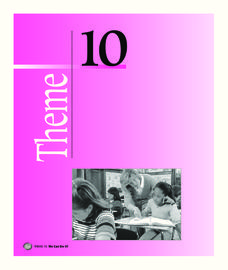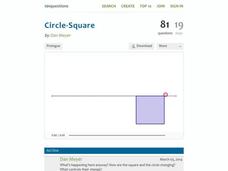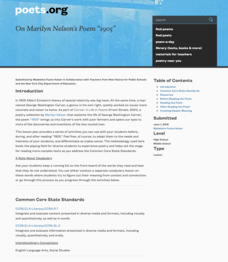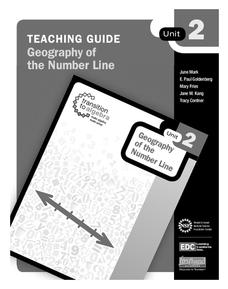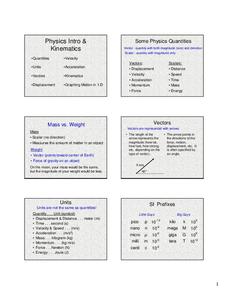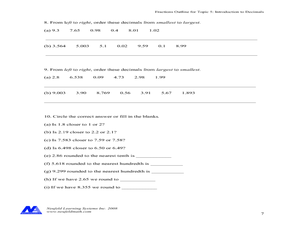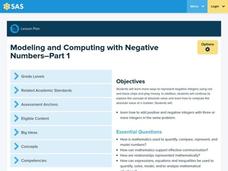Student Handouts
Learning Cubes
Add a game-like aspect to class discussion or writing with a die that has something other than numbers on it. You or your learners can roll the die to decide if it's time analyze, compare and contrast, describe, explain and illustrate,...
Houghton Mifflin Harcourt
We Can Do It!: English Language Development Lessons (Theme 10)
English language development lessons are brought to you in poems, picture cards, and grand discussions in a We Can Do It! themed unit. Topics of discussion include daily challenges, parts of a whole, words that describe what we hear,...
Nuffield Foundation
Investigating the Effect of Concentration of Blackcurrant Squash on Osmosis in Chipped Potatoes
Model and explore osmosis using squash and potatoes. Young scientists expose chunks of potatoes to different concentrations of a squash solution. They compare the weights of the chunks before and after exposure to the solution and use...
101 Questions
Circle-Square
How do the area and perimeters of circles and squares compare? A clever video illustrates the change in the area of a circle and square while their total perimeter stays the same. The task is for learners to predict the point where the...
PBS
Decoding Media Bias
Alternative facts? After watching the We The Voters film, "MediOcracy," viewers compare how cable news outlets CNN, Fox News, and MSNBC report the same story about politics or public policy. After a whole-class discussion of their...
Academy of American Poets
On Marilyn Nelson's Poem “1905”
Marilyn Nelson's poem, "1905," asks young scholars to compare and contrast George Washington Carver and Albert Einstein. After studying images of the two scientists and listing their observations, class members listen to several readings...
ReadWriteThink
What is Poetry? Contrasting Poetry and Prose
Introduce middle schoolers to the different strategies used when reading prose versus poetry. Groups use a Venn diagram and a poetry analysis handout to compare the characteristics of an informational text and a poem on the same subject...
Illustrative Mathematics
But Mango Is My Favorite...
Opening up a package of fruit snacks is like a box of chocolates, you never know what you're going to get. When all the mango flavored ones are missing, learners calculate the probability that one bag versus the whole box is missing the...
Inside Mathematics
Coffee
There are many ways to correlate coffee to life, but in this case a worksheet looks at the price of two different sizes of coffee. It requires interpreting a graph with two unknown variables, in this case the price, and solving for those...
Education Development Center
Geography of the Number Line
It's more than just numbers on a line, its an organizational, mental math machine to help learners understand the value of numbers. The tool is handy when introducing positive and negative integers to see their values and relationships....
Urbana School District
Physics Intro, Kinematics, Graphing
Some consider physics the branch of science concerned with using long and complicated formulas to describe how a ball rolls. This presentation, while long, is not complicated, yet it covers rolling, falling, and more. It compares vectors...
Education Development Center
Micro-Geography of the Number Line
Young mathematicians dive into the number line to discover decimals and how the numbers infinitely get smaller in between. They click the zoom button a few times and learn that the number line doesn't just stop at integers. Includes a...
Corbett Maths
Enlargements with Negative Scale Factor
How will a scale factor affect a figure—negatively? Using a grid, the narrator of an engaging video performs a dilation with a negative scale factor. The presenter compares a positive scale factor with a negative scale factor to explain...
Pace University
Urban Communities
Urban communities are the focus of a series of lessons created to meet specific needs using differentiated instruction. A pre-assessment designates scholars into three groups based on their ability level. Small groups take part in...
ReadWriteThink
Captioning the Civil Rights Movement: Reading the Images, Writing the Words
Scholars boost their knowledge of the Civil Rights Movement with a lesson plan that challenges writers, readers, and historians to analyze primary sources and caption their observations. By way of reading, writing, discussion,...
Nebraska Department of Education
Work: Love It or Hate It?
Future job seekers interview adults who love their work and ones that dislike their work. After reflecting on what they learned in a whole-class discussion, participants create a mission statement that details what they want and don't...
Curated OER
Students' Strides
Complete problems using base ten blocks to see the difference in the place value of a decimal and how it affects a number's value. Learners compare decimal values as well. Ample time for discussion and modeling are allowed in the...
Curated OER
Building Sets of 13 and 14
Compose and decompose sets of 13 and 14 and compare sets of each with your little learners. They use objects to construct sets of 13 and 14, record their answers, and compare sets in several different ways.
Curated OER
Introduction to Equivalent Fractions
Explore equivalent fractions! Youngters measure the crown of their head with adding tape labeled with various fractions and fractional parts, and compare strips to notice numerical relationships. They fold adding tape in half and color...
Curated OER
Exploring Roman Numerals
Students investigate the values of a variety of Roman Numerals and compare and contrast the patterns with Arabic numbers. The application, "Numerus" is utilized to lead students through the lesson.
Curated OER
Introduction to Decimals
Young math whizzes complete the online instruction, then solve 20 problems about identifying decimals, comparing decimals and fractions and ordering decimals.
Curated OER
Dividing with Fractions
Use paper strips or models to relate division problems to division of fraction problems. Since the materials can be broken up, it helps them to show how they can complete repeated subtraction with fractions and not just whole numbers.
Curated OER
Growing Minds: My Plate
Examine food choices and the nutritional properties of food groups with this visually appealing whole-class lesson plan. This will take a bit of preparation, but once you do it, you can use the materials for years. Using a food groups...
Curated OER
Big Boats Up The River
Using boats along in the Port of Albany as the focus, learners practice adding single-digit numbers and interpreting data. This lesson comes with the worksheets, resource links, and other materials to make it a worthwhile experience.
Other popular searches
- 2nd Grade Comparing Numbers
- Comparing Numbers to 1000
- Math Comparing Numbers
- Comparing Numbers to 20
- Comparing Numbers to 999
- Ordering and Comparing Numbers
- Comparing Numbers Using <>=
- Comparing Numbers Worksheets
- Negative Comparing Numbers
- Comparing Four Digit Numbers
- Comparing Numbers 1 20
- Comparing Numbers to 50



